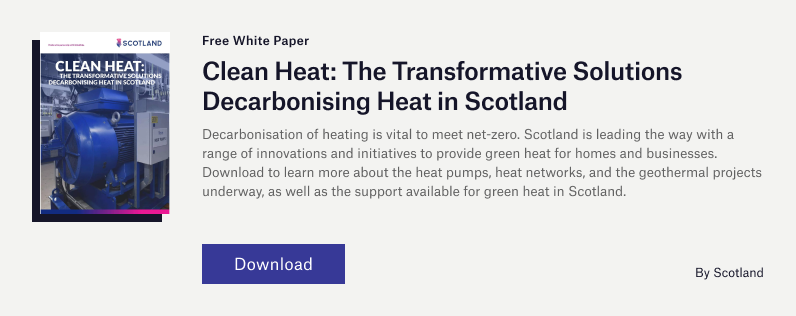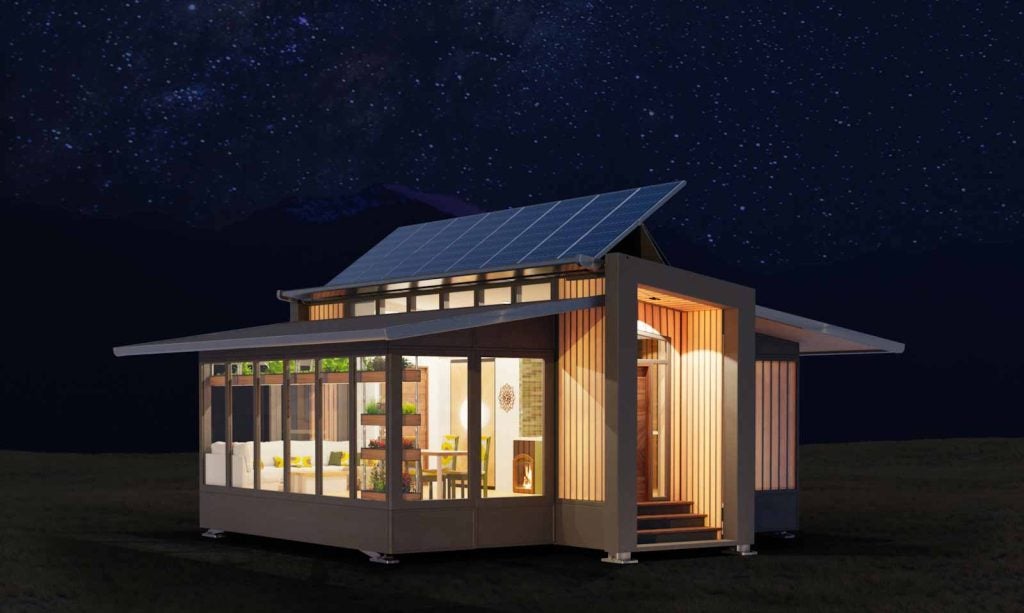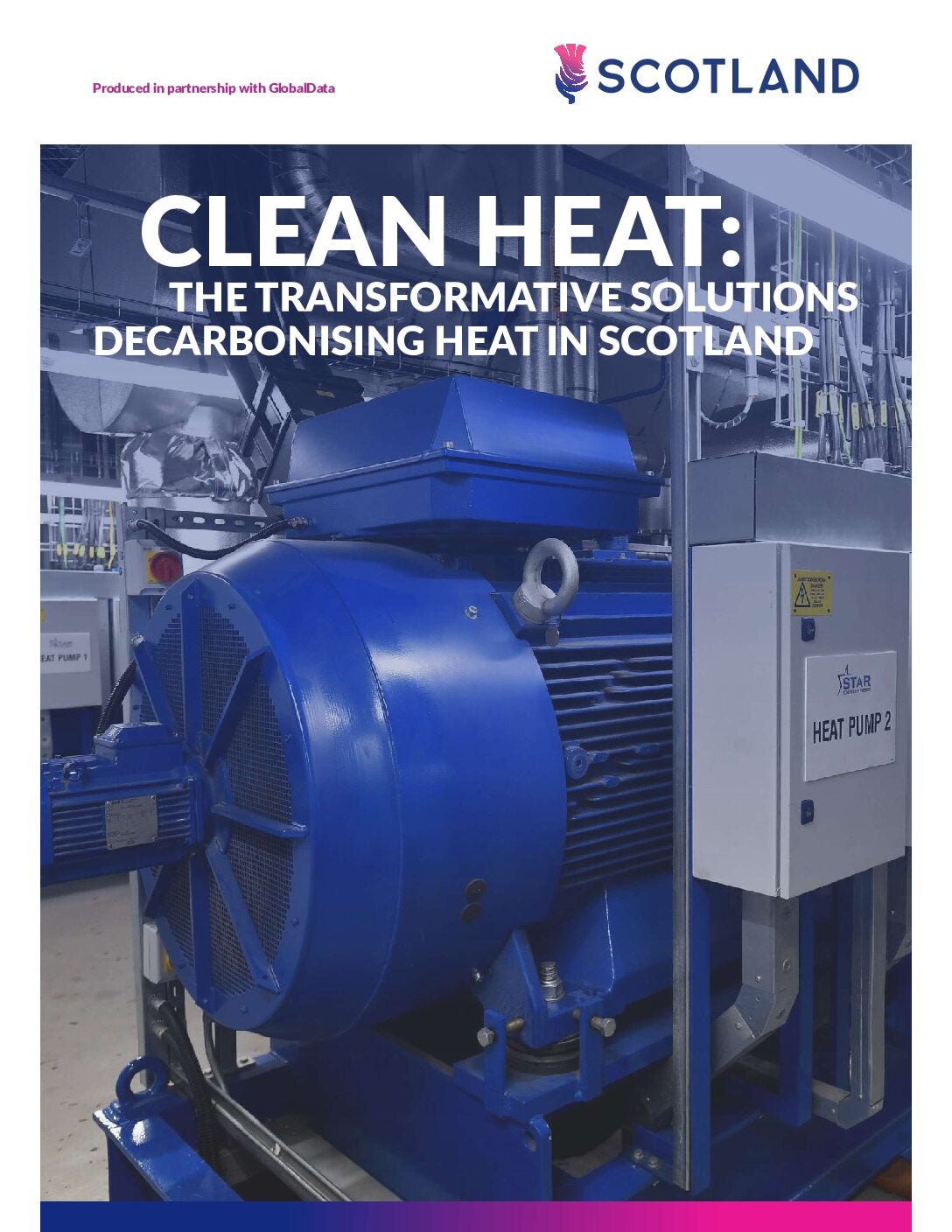
With heat generation responsible for an estimated 40% of all global emissions, it is essential to develop new solutions for heating homes and energy efficiency.
This need presents business opportunities. In Scotland, entrepreneurs are leading the innovation drive to produce clean heat technologies. Bolstered by the clean heat support network in Scotland, promising ideas are turning into tangible businesses. Breakthrough concepts are even being created by innovators with relatively little experience in the field.

Clean heat entrepreneurs range from established businesspeople moving to different sectors and start-ups straight out of university to completely new arrivals to Scotland carrying little more than ideas. Here, we explore their stories and technologies.
Clean heat pioneers in Scotland
Edinburgh-based Sunamp designs and manufactures heat batteries. Established in 2005, Sunamp’s clean technology was ahead of its time – founded ten years before the Paris Climate Agreement.
Andrew Bissell and Susan Lang-Bissell were considering retirement after a highly successful career in medical visualisation. Andrew founded Voxar in 1995 as a spin-out from the University of Edinburgh, where he studied computing science in the late 1980s. He sold the company to Barco in 2004 in a multi-million-pound deal.
However, before the couple could retire, they realised there was another challenge they had to help overcome – climate change. Living near the coast on the outskirts of Edinburgh, Andrew and Susan saw the impact that rising sea levels could have on coastal communities and already noticed environmental changes.
“It was very apparent that something’s going on,” says Susan. “The tide was coming in progressively higher. Storms had a different nature to them. Sand would be thrown way up the street after a storm.”
After spending some time weighing up options and exploring different potential solutions, they decided that energy was the way to make the biggest difference.
Heating and cooling account for an estimated 46% of all global energy consumption, which is largely dependent on fossil fuels. Yet despite significant advancements in electric battery technology, no-one had successfully developed a thermal battery capable of efficiently storing heat.
Developing a technology that could help reduce this carbon dependence was where the couple set their sights. They were on a mission to enable renewables and support the electrification of heat. They took inspiration from the work of Joseph Black, who discovered latent heat, and Maria Telkes who in the 1940s tried and failed to store heat from the sun in phase-change materials (PCMs) to power heating and hot water in the home.
Overcoming challenges with clean heat technologies
PCMs can store and release large amounts of thermal energy by undergoing a phase change from solid to liquid or vice versa at a specific temperature. For Sunamp, a major obstacle was finding PCMs with sufficient stability over multiple cycles. Andrew and Susan contacted the organisation Interface, which connects businesses with academic experts in Scotland who may be able to solve industrial problems.
Inferface asked if they would be interested in speaking with Colin Pulham, professor of high-pressure chemistry at the University of Edinburgh, who was studying chemical crystallisation. This marked the start of a successful partnership that has resulted in accolades such as the Royal Society of Chemistry award for industry-academia collaboration in 2022, followed in 2023 by the powerful partnerships award from the Scottish Knowledge Exchange Awards and the first-ever King’s Award for Enterprise.
“We formed a really strong working partnership, which more than a decade later is still going extremely strongly,” adds Andrew.
Yet there were still many challenges that had to be overcome. To secure the necessary funding and investment, the team had to move from a lab-based concept to manufacturing at pace.
“It killed us because we had to do all that in nine months – but at the same time, it made us,” says Andrew. “The company had proved it could industrialise and that made us more attractive to bigger investors.”
The company has received backing from international investors and domestic bodies such as Scottish Enterprise and Innovate UK. To date, over 25,000 Sunamp heat batteries have been installed in homes around the UK and abroad. The company’s high-performance Plentigrade P58 PCM, developed with the University of Edinburgh, has been tested for 40,000 cycles. This works out at more than 50 years of continuous use at two charging cycles per day, saving up to 75% on energy bills.
The company’s workforce is a mix of domestic and international workers, with people who have PhDs working on scientific solutions alongside production operatives who may have previous experience working in pubs.
“It is a nice atmosphere and there is no blame culture. Just get on with your work and we will make it interesting for you,” says Susan. “We have some good social events and we favour quite a flat structure. That’s just the learnings from Voxar. The fit is really important – that and the culture.”
The company already has a presence in 17 countries worldwide. Retirement for Andrew and Susan will have to wait a little while longer.
Geothermal business opportunities
Similar to how Andrew Bissell from Sunamp started out, our next clean heat entrepreneur set up his first company straight out of university. David Townsend is CEO of geothermal innovator TownRock Energy, which he established soon after he graduated with a geology degree from the University of St Andrews in 2013.
The company is perhaps best known for developing the innovative technology for BODYHEAT at Glasgow nightclub SWG3, where heat from the dancefloor is extracted and stored for later energy use by the venue.
In the final year of his degree, David was working on a thesis about the geothermal energy potential of Scotland when he received an email from a university initiative, the Young Innovators Challenge, where the winners would receive support to set up a business. He says he hadn’t given much thought to setting up his own business before the email arrived.
“I hadn’t found a single person in Scotland who was trying to commercialise geothermal energy,” he says. “There were some ground source heat pump companies and there were some academics working on the science – but no company was saying geothermal is a good idea. I thought there was clearly a gap in the market for that. So, why not start that?”
Starting a geothermal energy business in Scotland
After success in the university competition, David received support from a mentor for the first 18 months of the company, along with a vital £50,000 grant to allow him to get operations started.
“That was my first experience of the Scottish support ecosystem, which was fantastic,” he explains. “I went from having zero knowledge of how to start a business to suddenly knowing all of the basics.
“It would have been impossible to set the company up without that at the time because I was 22. I had no savings, no income, and no experience. It was just me, with an undergraduate degree and some really experienced mentors. I quickly roped them into the company and provided some of them with equity in exchange for their help.”
It took around 18 months before the company landed its first client and generated revenue. The grant helped considerably to bridge this gap.
TownRock Energy is now ten-and-a-half years old. Yet for the first eight years, there was a small workforce made up of David, a couple of staff and two or three directors. This all changed two years ago with support from the Scottish Enterprise Green Jobs Fund.
“That allowed us to really accelerate,” says David. “We quadrupled our headcount in six months and now we are about ten people.”
TownRock Energy has also benefitted from the expertise and talent available at Scottish universities.
“Scotland is blessed with world-leading universities and we work really closely with most of them,” adds David. “Strathclyde and Edinburgh are the ones we work with most closely right now on a large project basis.”
Future geothermal innovations
Estimates from the UK Coal Authority suggest that flooded coal mines in Scotland could contain as much as 7,920 petajoules (PJ) of useable heat. To give an idea of this scale, 1,080PJ was used to heat homes in the UK in 2020, with energy coming from natural gas.
“There is a vast untapped potential of renewable energy in the ground beneath us,” says David. “There are lots of technologies that are improving every day.”
TownRock Energy is involved with Galleries 2 Calories, a pioneering initiative where heat from the UK’s largest data centre at the University of Edinburgh will be stored in nearby flooded coal mines and reused when required. Projects such as this are crucial for proving the viability of geothermal energy at scale and enhancing scientific understanding.
“We are on a mission that is measured in decades, not months or years, unfortunately,” says David. “That is the reality of the energy transition and the fight against climate change.”
TownRock Energy has proven that there is a growing commercial market for geothermal energy. The company has many private clients, which provide the majority of its revenue.
“We have projects that work, and I would expect that, by 2030, they will be commercially viable and replacing fossil fuels all over the UK and further afield,” says David.

New concepts for energy-efficient housing
As well as clean heat veterans and growing start-ups, Scotland is also home to some completely new arrivals, specifically for clean heat.
Kionnali Living Systems was founded by American couple Corrin Fox and Avriel Skolnick in 2022. The two of them were living off-grid in the US and compiled a spreadsheet of potential global destinations where they could realise their energy-efficient concept for sustainable living systems. Scotland came out on top.
“[With] the focus the Scottish Government has on sustainable technology and green heating, we saw an incredible opportunity here,” says Corrin. “We kind of arrived with nothing and tried to plug ourselves into that [network].”
An advisor at Business Gateway in Aberdeen put them in touch with Scottish Enterprise, which helped provide access to funding and experts who could refine their business model. The company is now working with the University of Aberdeen and the University of Strathclyde on further research. Such support and funding allow new concepts to be de-risked as they develop.
“We have some amazing business advisors through Scottish Enterprise,” says Avriel, who has a degree in environmental sciences and has researched sustainable and durable housing, as well as organic agriculture. “Honestly, I don’t know how we would have gotten this far if we hadn’t come here.”
Addressing sustainable housing challenges
Not only is there a lack of housing available globally, but existing properties are at increased risk of flooding and landslides from climate change. Power cuts are also becoming more common.
Kionnali Living Systems’ Roamstead is a new type of modular and mobile housing designed to be self-sufficient on or off the grid, powered entirely by renewables. Each unit features highly efficient insulation, an integrated energy system, a circulatory water system, designated areas to grow food, as well as a composter for dealing with waste. Smart living is integral to the design, with software and apps providing controls and insights to ensure optimum efficiency, alongside connecting with properties in the community.
“It is a totally different way of thinking about [and] developing real estate,” explains Corrin. “You can have a raw piece of land and we can place one of our buildings down. Within a day, you have a functional space that is heated, lit and [has] everything you need.”
Furthermore, Roamsteads have been designed to have a long lifecycle and be fully recyclable. The individual components are currently in various stages of development or production.
“Through the Scottish Enterprise support, we’ve been able to develop those individual technologies to a much higher level of maturity,” he says. “We were able to develop that technology in such a way that is much more robust and something we can sell individually. That opens up a lot more pathways for us.”
The target is to have a near-complete Roamstead available as a demonstrator in the first quarter of this year, followed by a pilot community. Corrin and Avriel are currently speaking with Scottish landowners to determine the optimum location.
The adverse weather regularly experienced in Scotland will provide an ideal testing ground to prove the efficiency of the Roamstead concept. “Our system works in the Scottish winter – but if you take it to somewhere like Arizona, where it is sunny all the time, it doesn’t even break a sweat,” adds Corrin.
Corrin and Avriel are now hoping to expand their business in Scotland. There are hopes that the units could be sent to disaster areas or provide long-term shelter for those in need. “This just seemed like a climate hub where people are thinking about the future and starting to prepare for that,” adds Avriel. “We really wanted to be part of this transition that Scotland is making.”
To learn more about Scotland’s clean heat sector, download the specially commissioned document below.



